DEMOCRATIC REPUBLIC OF THE CONGO
Summary of SRI in Democratic Republic of the Congo
In 2007 and 2008, Baile Mutambue, an agronomist with the National Rice Program in DRC, reported that SRI methods have been tried for several years in Kinshasa, Mbandaka, Kikwit, Mbanza-Ngungu, and Kisangani and have successfully increased average paddy yields from 1 ton/hectare to 1.5 or 3 tons/hectare. In 2013, the Italian NGO, Mazao, trained farmers in SRI methods in the Tanganyika district of Kalanga province, with experimental fields receiving yields as high as 9 tons/hectare. Also in 2013, the NGO BATIDE collaborated with the National Rice Program and the European Cooperative for Rural Development (EUCORD) to conduct SRI trials in Kingabwa, in the western part of the country, which reported yield increases with SRI of 64-121% with four rice varieities. The project was renewed with phase II running 2015-2018. To the east, in the Ruzizi plain of South Kivu, the Belgian NGO VECO has begun teaching SRI methods to farmers, with photos and results posted on their facebook page. Finally, during 2016, a report from the US-based Woods Hole Research Center describes the onset of a project (Projet Équateur) in the DRC's northern Equateur province to study the possibility of using SRI methods to make use of a degraded swamp area. Mid-2016 project results record tripling of rice yield, though finding labor to construct and work in paddies while converting from slash-and-burn agriculture has slowed SRI adoption; Projet Équateur is hoping to use REDD+ funds to reduce agricultural extensification. During December 2016 and January 2017, the NGO Mazao reported on their success using SRI methods in an economic development project with a sizable Pygmy population in conflict areas in Kalemie, Tanganyika province. In 2018, Rikolto in DRCongo became facilitator of the rice sector in an agricultural program in the Great Lakes region: PICAGL, a three-year program funded by the World Bank is intended to ensure that "the rice value chain is efficient and sustainable and contributes to food sovereignty in the provinces." The program, which operates in South Kivu and Tanganyika provinces, promotes SRI methods.
Progress and Activities
2021 Updates
 Farmer Field Schools Show Results in South Kivu and Tanganyika Provinces
Farmer Field Schools Show Results in South Kivu and Tanganyika Provinces
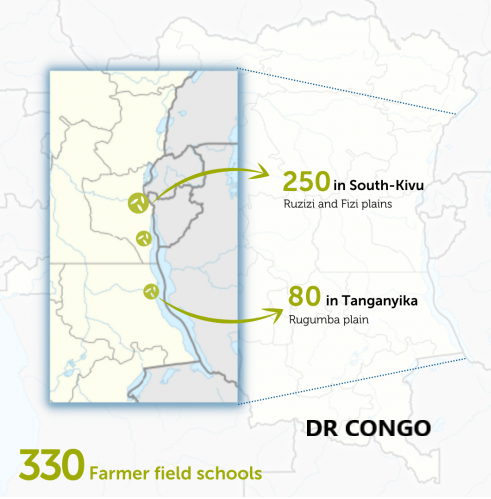 [December 10, 2021]
Since May 2019, 330 Farmer Field Schools have been set up in the provinces of South Kivu and Tanganyika by Rikolto staff as part of the Great Lakes Integrated Agriculture Development Project for Africa (PICAGL).(See item below for details on PICAGL). The objective was to improve rice productivity, reduce production costs and improve rice quality and sustainability through the dissemination and implementation of the System of Rice Intensification (SRI) and Integrated Soil Fertility Management (ISFM). The fields of each FFS were subdivided into plots where three different farming techniques were applied (the SRI, ISFM and farmers' normal practices).
250 FFS were set up and 7,687 rice farmers involved in the South-Kivu region
80 FFS set up and 2,000 rice farmers involved in the Tanganyika region. Yields obtained through the application of SRI and ISFM were considerably higher than the conventional. In the Fizi region, the SRI gave the best results and was also the most adopted method. The low demand for seeds with SRI drew farmers’ attention. The average amount of seeds used was 120 kilos per ha compared to an average of just 10 kilos for SRI! [See full Rikolto article.]
[December 10, 2021]
Since May 2019, 330 Farmer Field Schools have been set up in the provinces of South Kivu and Tanganyika by Rikolto staff as part of the Great Lakes Integrated Agriculture Development Project for Africa (PICAGL).(See item below for details on PICAGL). The objective was to improve rice productivity, reduce production costs and improve rice quality and sustainability through the dissemination and implementation of the System of Rice Intensification (SRI) and Integrated Soil Fertility Management (ISFM). The fields of each FFS were subdivided into plots where three different farming techniques were applied (the SRI, ISFM and farmers' normal practices).
250 FFS were set up and 7,687 rice farmers involved in the South-Kivu region
80 FFS set up and 2,000 rice farmers involved in the Tanganyika region. Yields obtained through the application of SRI and ISFM were considerably higher than the conventional. In the Fizi region, the SRI gave the best results and was also the most adopted method. The low demand for seeds with SRI drew farmers’ attention. The average amount of seeds used was 120 kilos per ha compared to an average of just 10 kilos for SRI! [See full Rikolto article.] SRI Support Grows in South Kivu and Tanganyika Provinces
SRI Support Grows in South Kivu and Tanganyika Provinces
[September 1, 2021] According to an article on the Rikolto website, the three-year World Bank-funded Great Lakes Integrated Agriculture Development Project for Africa (PICAGL) is making good progress with its rice-sector work (facilitated by Rikolto) in the provinces of South Kivu and Tanganyika. In the Farmer Field Schools in South Kivu and Tanganyika provinces, groups of 25 producers meet regularly in the field with a
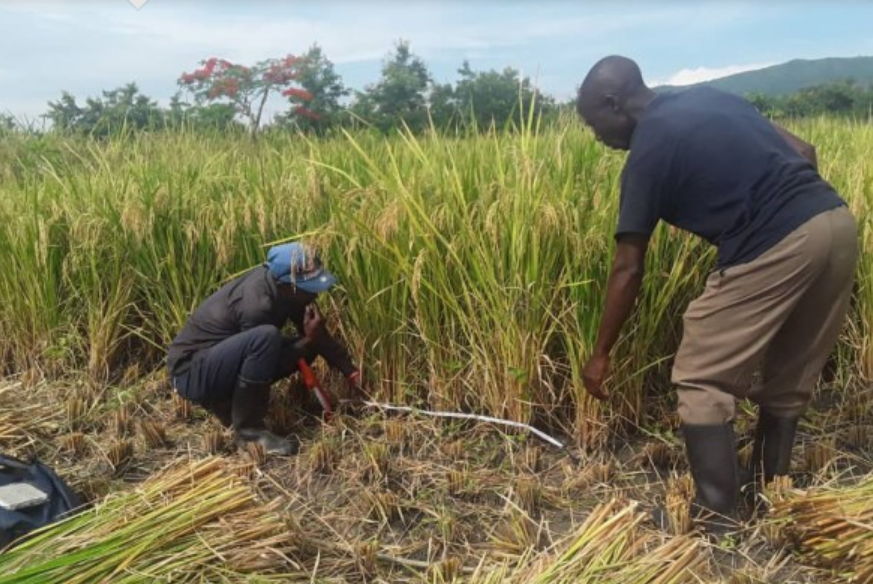 facilitator to learn from practicing old and new technologies (see photo at right). The SRI methods resulted in higher yields than the other technologies used.
facilitator to learn from practicing old and new technologies (see photo at right). The SRI methods resulted in higher yields than the other technologies used. SRI is also primarily adopted because of its high yield and low demand for inputs (allowing farmers to reduce their costs of production). The low input demand is not only linked to the organic matter supply, but also to the quantity of seed required. In the case of Fizi, farmers reduced their seed from 120 kg/ha to 10 kg with SRI, which not only saved 110 kg of seed per hectare but resulted in higher yields. Regarding organic matter, the low dependence on inorganic fertilizer advocated by SRI has environmental benefits. However, organic matter is often lacking, and is needed in large quantities when it is rarely available. To cope with this shortage of organic matter, the project now recommends using mineral fertilizers if necessary, but optimizing their use by applying them together in combination with organic matter. More details on the PICAGL project can be found in the Rikolto article or the 2019 updates below.
2019
 Rikolto in DRCongo Promotes Improved Rice Production in South Kivu and Tanganyika
Rikolto in DRCongo Promotes Improved Rice Production in South Kivu and Tanganyika
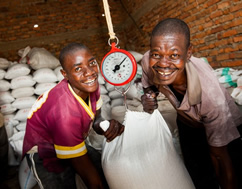 [August 20, 2019]
In the two eastern DRCongo provinces of South Kivu and Tanganyika, Rikolto aims to have a lasting impact on the irrigated rice sector.
Rikolto in DRCongo is facilitator of the rice sector in an integrated program of agricultural growth in the Great Lakes region: PICAGL, a three-year program funded by the World Bank is intended to ensure that "the rice value chain is efficient and sustainable and contributes to food sovereignty in the provinces of South Kivu and Tanganyika." The co-investment or “shared cost subsidies” ranges from 20 to 50% for the producer's part. Producers, whose average area is half a hectare, are expected to gradually increase from 1,000 in 2018 to 25,000 in 2021. Hence, there will be 30,000 new beneficiaries of rice paddy improvements in 2021. If in 2018, the number of rice farmers was estimated at 27%, this figure will increase to 40% in year 3 of PICAGL.
Yields per hectare ae expected to double, going from two and a half tons in 2018 to five tons in 2021. The volume of rice produced will increase substantially to 137,500 tonnes in 2021 compared to 1,250 in 2018. As part of PICAGL, Rikolto in DRC will co-create specific inclusive business models for the rice sector. The project is committed to innovating “with”, not “for” rice farmers. Micro, small and medium-sized enterprises will have inclusive business models for each of the players benefiting from project support. The vision is to bring rice producers to the market. Access to seeds / inputs and credit, which is the key to achieving the objectives in terms of rice produced and sold.
Rikolto in DRCongo will support the rice farmers to improve yields, in particular by better management of soil fertility and the application of the The System of Rice Intensification (SRI) methods. They will also support cooperatives in organizating to collectively access inputs.
[August 20, 2019]
In the two eastern DRCongo provinces of South Kivu and Tanganyika, Rikolto aims to have a lasting impact on the irrigated rice sector.
Rikolto in DRCongo is facilitator of the rice sector in an integrated program of agricultural growth in the Great Lakes region: PICAGL, a three-year program funded by the World Bank is intended to ensure that "the rice value chain is efficient and sustainable and contributes to food sovereignty in the provinces of South Kivu and Tanganyika." The co-investment or “shared cost subsidies” ranges from 20 to 50% for the producer's part. Producers, whose average area is half a hectare, are expected to gradually increase from 1,000 in 2018 to 25,000 in 2021. Hence, there will be 30,000 new beneficiaries of rice paddy improvements in 2021. If in 2018, the number of rice farmers was estimated at 27%, this figure will increase to 40% in year 3 of PICAGL.
Yields per hectare ae expected to double, going from two and a half tons in 2018 to five tons in 2021. The volume of rice produced will increase substantially to 137,500 tonnes in 2021 compared to 1,250 in 2018. As part of PICAGL, Rikolto in DRC will co-create specific inclusive business models for the rice sector. The project is committed to innovating “with”, not “for” rice farmers. Micro, small and medium-sized enterprises will have inclusive business models for each of the players benefiting from project support. The vision is to bring rice producers to the market. Access to seeds / inputs and credit, which is the key to achieving the objectives in terms of rice produced and sold.
Rikolto in DRCongo will support the rice farmers to improve yields, in particular by better management of soil fertility and the application of the The System of Rice Intensification (SRI) methods. They will also support cooperatives in organizating to collectively access inputs.Rikolto will inventory equipment and begin working on mechanization. There will also be an experience exchange visit to West Africa and Indonesia under the facilitation of Rikolto. Then equipment tests will be undertaken with tractors, plows, tillers, animal traction, etc. Before and after processing, Rikolto in DRC will introduce techniques to reduce rice losses. They will promote collective purchasing and facilitate the establishment of partnerships and inclusive contracts between producers, processors and traders -- a win-win logic. Partnerships will be forged between cooperatives and wholesale companies and distributors of inputs, producers of organic fertilizers, rice husk briquettes, livestock feed, transport companies, wholesalers and retailers. Nothing is lost, everything is transformed.... The rice bran will be used as animal feed. The rice husk will be used in the production of organic fertilizers: bio-urine, wood vinegar, biochar. The rice husk can also be transformed into briquettes to replace the makala, the charcoal at the base of the deforestation of Congolese forest areas. Rikolto is a catalyst (consultant) and has designed an empowerment strategy for the actors supported from the start of the support. The partnership goes beyond the duration of the funding... until the achievement of shared objectives. Their first innovation is co-investment, allowing real ownership. [See French language article on the Rikolto website.]
2017
 Phase II of the Kingabwa Rice Intensification Project Makes Progress
Phase II of the Kingabwa Rice Intensification Project Makes Progress
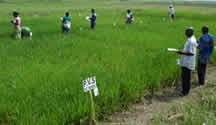 [June 2017] The Kingabwa Rice Intensification Project phase II (PIRK II), which began in 2015 and is slated to run until 2018, is a continuation of the 2011-2015 Rice Intensification Project funded by USAID.
The project partners are Winrock (lead), BATIDE, National Rice Programme, National Nutrition Programme, Kingabwa Farmers Association and Cooperative.
In the second phase of the project, the European Cooperative fro Rural Development (EUCORD) continues to build on the existing relationship with local NGOs and the private sector partner. The goal is to develop 120 ha of irrigation land in the Malebo pool, demonstrate SRI, and support the development of a brand for Kingabwa rice (“Ngwele” rice) to improve marketing.
[June 2017] The Kingabwa Rice Intensification Project phase II (PIRK II), which began in 2015 and is slated to run until 2018, is a continuation of the 2011-2015 Rice Intensification Project funded by USAID.
The project partners are Winrock (lead), BATIDE, National Rice Programme, National Nutrition Programme, Kingabwa Farmers Association and Cooperative.
In the second phase of the project, the European Cooperative fro Rural Development (EUCORD) continues to build on the existing relationship with local NGOs and the private sector partner. The goal is to develop 120 ha of irrigation land in the Malebo pool, demonstrate SRI, and support the development of a brand for Kingabwa rice (“Ngwele” rice) to improve marketing.The project, which supports 2,000 rice farmers and the surrounding community, has supported the development of several local enterprises, including a woman-led rice seed multiplication business, a composting company and the rice marketing cooperative. Thus far, the PIRK II project has seen significant improvements to the deteriorated irrigation infrastructure, and an adoption of improved production techniques. The project has leveled 72 ha of land, installed a water pump for controlled irrigation, and established 24 wells for vegetable irrigation. Over 1,200 farmers have received training in intensive rice production techniques, including SRI, and received technology packets. (see EUCORD project description)
 "After so much work, the first results can now be seen!"
"After so much work, the first results can now be seen!"
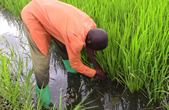 [January 26, 2017] According to an article in the January 2017 Mazao Newsletter, SRI training in Mazao's SRI Project in Kalemie, D.R. Congo, has led to visible results only two months after sowing: The ears of rice grown from each seed have literally doubled in 80% of fields compared to rice cultivated with traditional techniques. While before the plants accounted for an average of 30 ears, now plants 60-70 ears. Barring any unforeseen events, the farmers are expected to harvest at least 5 tons of rice per hectare. Field staff and farmers have been congratulated!
[January 26, 2017] According to an article in the January 2017 Mazao Newsletter, SRI training in Mazao's SRI Project in Kalemie, D.R. Congo, has led to visible results only two months after sowing: The ears of rice grown from each seed have literally doubled in 80% of fields compared to rice cultivated with traditional techniques. While before the plants accounted for an average of 30 ears, now plants 60-70 ears. Barring any unforeseen events, the farmers are expected to harvest at least 5 tons of rice per hectare. Field staff and farmers have been congratulated!
2016
 Mazao's SRI Project in Kalemie Lauded for Progress in Agriculture Development, Peace and Stability
Mazao's SRI Project in Kalemie Lauded for Progress in Agriculture Development, Peace and Stability
[December 16, 2016 ] The first phase of the NGO Mazao's Agro-ecological Rice Supply Chain Programme concluded during December 2016. Eighteen hectares of paddy rice were planted in Kampunda using the SRI methods. The Provincial Minister of Social Affairs and the Family lauded the rice program, which is being carried out in partnership with WFP-PAM, for the significant contribution it is making to the local agricultural development and especially to peace and stability of this area.

The Minister refered to the decisive role which the inclusion of Pygmies population in the project (more than half of the 3,160 beneficiaries) has played in building stability in this area. Pygmies involved in the project decided not to join their nearby brothers who recently were involved in fanning the conflict between Bantu and Pygmies. The will of the Kampunda’s Pygmies to maintain peace is reportedly due to the economic well-being generated through the project's activities. Furthermore, since they have been trained with SRI rice farming, they will be able to replicate the experience in other areas if they decide to move (they are nomads). Mazao believes that the active presence of development agents in the villages with inclusive actions targeted to the improvement of life conditions of vulnerable populations in the long term can actually have a positive impact on the future of these areas. [... read more in the December 2016 Mazao newsletter.]
 REDD+ Funds Could Help SRI Become an Important Cost-Effective Strategy
to Reduce Pressue on the Forest
REDD+ Funds Could Help SRI Become an Important Cost-Effective Strategy
to Reduce Pressue on the Forest
[August 10, 2016] “It has to be cost effective. It’s not about some expensive technology, it’s about appropriateness and cost effectiveness,” says Dr. Glenn Bush, Woods Hole Research Center's (WHRC) Projet Équateur’s principal investigator. The northern province of Équateur is not only the most forested
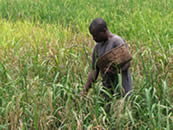 province in the country, but also the poorest; most of the people depend on the forest for their livelihoods. Bush cites SRI as an example of a cost-effective technology used by the project. He notes that, "It's success rate depends on how households manage their labor. New technologies pose a great risk to poor people. And anything that requires even a small outlay of cash is unattainable by many.”
SRI had remarkable impacts with Projet Équateur trials, but it reportedly hasn’t enjoyed much widespread adoption yet, because at key times of the year family members that need to be recruited to weed, or to create a new paddy field, they have gone off to work in someone else's field or elsewhere to earn extra cash.
Melaine Kermarc, WHRC's Projet Équateur manager, adds, "It’s also that people are unable to find the labor force necessary to create the paddy in the first place. It’s a huge initial investment. Once the paddy is there though it becomes a great incentive not to go further to deforest because they have regular income or food, with limited amount work in comparison to other crops. If the farming households can’t get to the point where they actually see the benefit, they will be unlikely to adopt a new technology, however promising."
province in the country, but also the poorest; most of the people depend on the forest for their livelihoods. Bush cites SRI as an example of a cost-effective technology used by the project. He notes that, "It's success rate depends on how households manage their labor. New technologies pose a great risk to poor people. And anything that requires even a small outlay of cash is unattainable by many.”
SRI had remarkable impacts with Projet Équateur trials, but it reportedly hasn’t enjoyed much widespread adoption yet, because at key times of the year family members that need to be recruited to weed, or to create a new paddy field, they have gone off to work in someone else's field or elsewhere to earn extra cash.
Melaine Kermarc, WHRC's Projet Équateur manager, adds, "It’s also that people are unable to find the labor force necessary to create the paddy in the first place. It’s a huge initial investment. Once the paddy is there though it becomes a great incentive not to go further to deforest because they have regular income or food, with limited amount work in comparison to other crops. If the farming households can’t get to the point where they actually see the benefit, they will be unlikely to adopt a new technology, however promising."If SRI goes into a community as part of the REDD+ program, the project could use some of the REDD funds to provide incentives for people to stay on their fields, and really adopt SRI, which could triple yield. REDD+ is about combating deforestation, which is due to industrial forestry as well as smallholder agriculture and demand for charcoal. Slash and burn techniques have removed around one million hectares of forest cover in the last twelve years in Équateur Province alone. Projet Équateur hopes to use from REDD+ and other sources to help these small farmers intensify their agricultural production, by sponsoring the right type of agricultural training along with small rural activities that focus on the direct drivers of deforestation. In order reduce deforestation related to slash-and-burn, which is an "extensification" of agriculture, the WHRC project would like to replace traditional practices with new practices, such as the SRI agricultural intensification model. [See full WHRC article.]
 VECO Trials in South Kivu obtain average yields of 7.4 t/h
VECO Trials in South Kivu obtain average yields of 7.4 t/h
The Belgian NGO VECO has been experimenting with SRI methods on test plots and teaching farmers about them in the Ruzizi plain in South Kivu. Thirty farmer field schools participated in the trials, which resulted in average yields of 7.4 t/h. Photos of the farmers and fields can be found on the VECO Facebook page.
 Woods Hole Research Center Embarks on SRI Promotion with the Project Equateur
Woods Hole Research Center Embarks on SRI Promotion with the Project Equateur
[April 9, 2016] Glenn Bush and Melaine Kermarc are managing the SRI component of Woods Hole Research Center's (WHRC) Projet Equateur, which sought to find alternative methods to slash-and-burn rice farming in the DRC's northern Equateur province. The project used degraded swamp areas to introduce SRI as a wetland rice paddy system. The trial yields were reported to be successful and the project now intends to educate villagers in SRI methods as well as composting, which is an important step in maintaining soil health in the SRI fields. (see details in the WHRC newsletter and the Project Equateur website.)
2013-2015
-
 Kingabwa Project Demonstrates Improved Tillering and Grain Yields with SRI on Four Varieties
Kingabwa Project Demonstrates Improved Tillering and Grain Yields with SRI on Four Varieties
[January 2013] Pierre Sassa and Gustave Cileu from the NGO Bureau d’Appui et d’Assistance Technique aux Initiatives de Développement (BATIDE) collaborated with the Programme National Riz to conduct SRI trials in Kingabwa, an area near Kinshasa. The Projet de l'Intensification de Riziculture à Kingabwa (PIRK) received funding from the European Cooperative for Rural Development (EUCORD) and conducted SRI trials from January 1 - May 30 2013. Project trials showed that within 60 days of transplanting rice planted with SRI methods had on average 29 tillers, compared to the 19 tillers found through conventional methods. The full SRI Kingabwa Report is available on the Batide website. The results of the four varieties of rice tested in the Kingabwa trials, which showed 64-121% yielded increases when tested on four varieties, are listed in the table below:
Variety
Yield – SRI
(MT/ha)Yield – conventional
(MT/ha)Yield increase
(%)Hubei 6
8.28
5.04
64%
Jasmine
6.86
3.92
76%
Sipi
5.89
2.66
121%
Nerica-L17
5.12
2.43
110%
 Mazao Likilimba of Rice and Social Rice Supply Chain
Mazao Likilimba of Rice and Social Rice Supply Chain
In June 2013, the Italian NGO Mazao launched the "Likilimba of rice" SRI pilot project in the Tanganyika district, which established a Social Rice Supply Chain (SRSC) with intentions of reducing the gap between smallholder farmers and consumers. The pilot project provided training in SRI methods, which resulted in experimental fields achieving 9 t/h. Farmers participating in the trials increased their rice production from 0.5-1 tons/ha to 5-6 tons/ha. A video produced by Mazao explains their work with the SRSC and their SRI training.
2007-2008
 National Rice Program Reports Positive Results with SRI trials
National Rice Program Reports Positive Results with SRI trials
Basile Mutambue, an agronomist with the National Rice Program, reports that SRI methods have been tried in the DRC for several years now, with positive results. Average paddy yields are less than 1 ton/hectare in the country, according to FAO statistics, but with SRI methods, yields are 1.5 to 3 tons/hectare. The methods are being used in rice-growing areas around Kinshasa, Mbandaka, Kikwit, Mbanza-Ngungu, and Kisangani. They were introduced by technicians from China, according to Mutambue.
Reports and Articles
- 2023. A walk through the past and the future of Congolese rice: an interview with Ivan Godfroid. RIKOLTO website. April 5. [Rikolto (a Dutch NGO) ag value chain article that briefly notes their work with SRI and ISFM in DR Congo.]
- Kabemba, Éric Dieudonné. 2021. Professionnalisation de la riziculture au Tanganyika: le chemin parcouru à Kamangu. Rikolto Congo website. September 10. [Rikolto agronomist in Tanganyika documents SRI progress adoption by 409 FFS rice-adopters, which includes 98 learned from other rice farmers. Good adopters reached 5-6 tons/ha.]
- 2021. SRI: développer la riziculture durable au Sud-Kivu. Rikolto website. Sept. 1. [Article about the NGO Rikolto's SRI work in South Kivu and Tanganyika provinces in the DRC. This article also has detailed methods used for using SRI in the project areas.]
- Saliboko, Merveille. 2019. Sud-Kivu et Tanganyika: professionnaliser la riziculture avec PICAGL. Rikolto website. August 20. [accessed February 17, 2020]
- EUCORD. 2017? Kingabwa Rice Intensification Project phase II (PIRK II) - 2015-2019. EUCORD website.
- Mazao. 2017. MAZAO Newsletter, January 2017. Mazao website. [accessed January 26, 2017] [SRI progress in Mazao's DR Congo site.]
- Mazao. 2016. Forest food Rrevolution. Mazao Newsletter, December 2016 issue. [Section on "Mazao’s rice in Kalemie, a success gained on the field" documents how SRI is part of the keeping the peace between the Bantus and the Pygmies.]
- Woods Hole Research Center. 2016. REDD+ in the Congo: It has to be cost effective. Woods Hole Research Center website. August 9. [SRI part of WHRC's Projet Équateur's REDD+ strategy in the DRC's Équateur province.]
- Woods Hole Research Center Newsletter. 2016. Successful crop trials in the DRC. WHRC website: April 8 .[See item about SRI on WHRC's Projet Equateur]
- Sassa, Jean Pierre, et Gustave Cileu. 2015. Essai d’introduction de SRI a Kinshasa /Kingabwa Pool Melebo. BATIDE website. (3p. pdf)
- Mazao. 2013. The Social Rice Supply Chain and Lilikimba Production. Mazao website.
News and Social Media
- 2016. VECO-RD Congo Facebook post. (SRI trials in South Kivu)
Videos
- 2015 (April 20). Mazao ONGD in Kalemie: The Social Rice Supply Chain. 7:05min. Mazao ONGD channel, YouTube. (Begin watching at 3:27 to view SRI training)
Photos
- Photos of SRI farmers are available on the BATIDE website.

